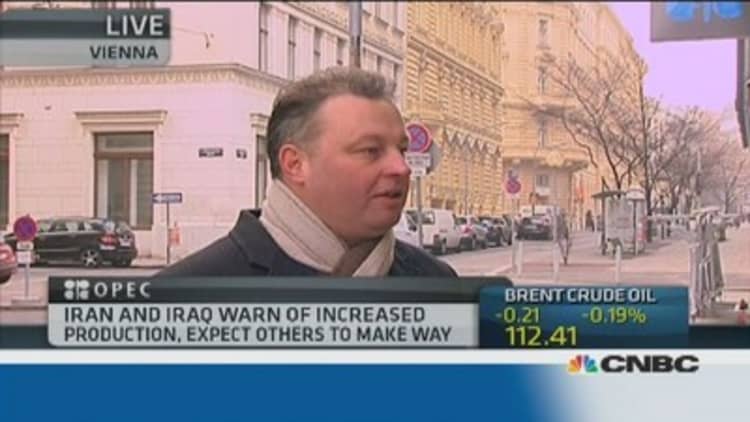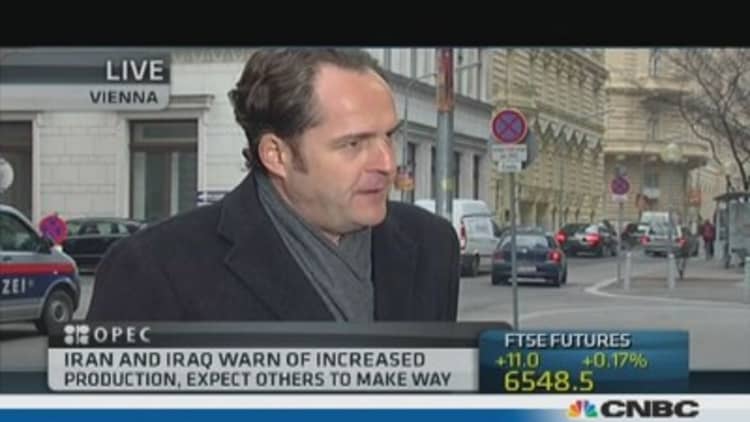Through the hustle and bustle of OPEC's meeting in Vienna on Wednesday, Iranian Oil Minister Bijan Namdar Zangeneh sent out an invite to oil majors across the globe.
Namdar Zangeneh said that Total of France, Anglo-Dutch Shell, Italy's ENI, Norway's Statoil, Britain's BP and U.S. companies Exxon and Conoco would be welcome to invest in Iran, according to Reuters.
Speaking to reporters at the meeting of the Organization of the Petroleum Exporting Countries (OPEC), he said he was already in talks with some of companies, specifying that none were from the U.S.
"We had no limitations for U.S. companies. Twenty years ago there were limitations against them from their own administration. For doing projects in Iran, we have no limitations," Reuters quoted him as saying.
(Read More: Saudi Arabia:Markets will handle Iran oil boost)
BP and Statoil declined to comment when contacted by CNBC, Total were not immediately available for comment.

Iran - the world's fourth biggest oil-producer according to the International Energy Agency (IEA) - and six world powers reached a breakthrough agreement in November to moderate Tehran's nuclear program in exchange for limited sanctions relief. Namdar Zangeneh told CNBC that the country was "technically ready" to start producing 4 million barrels per day (bpd) as soon as sanctions stopped, which would be around the middle of 2014.
Many analysts remain skeptical of the possibility that Iran would be able to hike production so quickly as oil fields in the country are rapidly maturing. Trond Omdal, an equity analyst at Arctic Securities that has previously worked for Statoil in Iran, added that there were a variety of other reasons why oil majors would be cautious on the welcoming invite.
(Read More: OPEC agrees to renew oil cap for six months: Delegates)
"It's not really a race for Iranian oil, more of a gentle walk," he said. Project challenges for western companies include a lack of transparency, corruption and having to use local suppliers, he warned. He added that "buyback" terms were also often unfavorable. Buybacks are where international oil companies invest billions upfront on projects in return for a pre-agreed share in oil and gas revenues.
Omdal conceded that there is significant potential for oil exploration in the country and if transparency and contract terms were improved, he expects some majors would be interested in investing in Iran.
John Olaisen, an equity analyst from ABG Sundal Collier echoed Omdal's comments that oil majors should be cautious. Security, commercial agreements and infrastructure development are all big issues that need to be tackled, he said. He added that the "promises and false hopes" in neighboring Iraq may also make investors reluctant.

"I think the (exploration and production companies) are more likely to be early movers into Iran. They are willing to take on more risk and move quicker," he said.
Gareth Lewis-Davies, senior oil strategist BNP Paribas told CNBC that investment is still very much reliant on whether these sanctions are actually lifted. The Middle Eastern country has been on the receiving end of strict sanctions since its revolution in 1979. Current oil sanctions by the U.S. and European Union on Iran's energy sector have been in place since 2012 and have prevented western energy companies from dealing with Tehran, slashing exports from 2.5 million bpd to around 1 million bpd.
"Sanctions on Iranian exports or investment in its energy sector are still firmly in place. Until such time that a follow-on accord is agreed and then implemented, it is therefore very unlikely that foreign investment will be forthcoming," Lewis-Davies said.
(Read More: Iran—the new investment frontier?)
Richard Mallinson, chief policy analyst at Energy Aspects told CNBC that European majors in particular are likely to remain very cautious until there is a comprehensive deal over the nuclear program.
"Companies like Total, Eni and Statoil all invested during the 1990s only to then suspend operations during the last decade as sanctions were tightened up. They will be weighing up how sustainable any diplomatic progress looks before committing to a return to Iran," he said.
"US firms face the toughest sanctions blocking them from involvement in Iran and I see little prospect of them taking on projects in Iran. I would expect to see national oil companies, particularly from Asia, and Russian firms all being interested in projects."
— CNBC.com's Matt Clinch. Follow him on Twitter @mattclinch81


